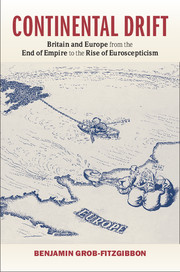Conclusion: Post-imperial Britain and the rise of Euroscepticism
Published online by Cambridge University Press: 05 May 2016
Summary
‘[M]ost of the problems the world has faced have come, in one fashion or another, from mainland Europe, and the solutions from outside it’. So proclaimed Lady Thatcher in 2002, writing in what was to become her last major intervention in public life, her book Statecraft. After tackling first the legacy of the Cold War, the rise of Asia and the tumult in the Middle East and Balkans, she turned to European ‘Dreams and Nightmares’. It was, she said, ‘the resolve of Britain, of the Commonwealth and, decisively, of America’ that had restored sanity to the European continent, although some Europeans had ‘resented it ever since’. She recommended against seeking solutions for the continent's problems, as ‘Europe as a whole is fundamentally unreformable’. It was far better to work around Europe. Finally, saving her strongest words for the conclusion, she wrote: ‘[T]he United States was based from its inception on a common language, culture and values – Europe has none of these things. … “Europe” is the result of plans. It is, in fact, a classic utopian project, a monument to the vanity of intellectuals, a programme whose inevitable destiny is failure’.
In the immediate aftermath of John Major's coming to power, Thatcher had been vocal – if somewhat cautious – about publicly criticising his European policy, on the one hand making known her displeasure but on the other not wishing to undermine his position in the way Heath had sought to undermine hers twenty years’ earlier. The Conservative General Election victory in April 1992 ‘liberated’ Thatcher to be far more assertive, no longer concerned that her comments might undermine the Prime Minister to the extent that she would risk allowing a Labour government under the stewardship of Neil Kinnock to come to power. Major himself seemed to sense this. After being congratulated by his private secretary Stephen Wall on winning his own mandate, the Prime Minister replied, ‘You wait. This is where my troubles really begin’.
Delivering an address at the Hague on 15 May 1992, only weeks after the election, Thatcher spoke with an unabashed Euroscepticism that was quite distinct from when she had been in government. Sarcastically referring to ‘the vision of New European Man walking purposefully towards the Common Agricultural Policy’, she said in strong terms: ‘Our choice is clear.
- Type
- Chapter
- Information
- Continental DriftBritain and Europe from the End of Empire to the Rise of Euroscepticism, pp. 461 - 470Publisher: Cambridge University PressPrint publication year: 2016



